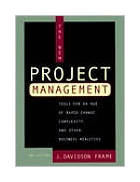|
||
• wydawnictwa polskie
• Zamów informacje o nowościach z wybranego tematu • kontakt
• Cookies na stronie |
THE NEW PROJECT MANAGEMENTFRAME Dwydawnictwo: JOSSEY-BASS , rok wydania 2003, wydanie IIcena netto: Drawing on more than twenty-five years experience consulting and training on project management in companies such as NCR, AT&T, and 3M, J. Davidson Frame updates and expands what he introduced in the first edition of The New Project Management in 1994-a set of core competencies for managerial success in a corporate climate where downsizing, outsourcing, and employee empowerment are a way of life. This new edition focuses on the hottest areas in project management today-augmenting and expanding the existing coverage of risk management and estimating, and including three all-new chapters on critical issues that did not even exist in 1994. J. Davidson Frame is Dean of Academic Affairs at the University of Management and Technology (UMT) in Arlington, Virginia. Prior to joining UMT, he established the project management program at George Washington University. He also served as director of the Project Management Certification Program at the Project Management Institute (PMI) and has served on PMI's board of directors. Frame has authored more than forty articles and five books, including Project Management Competence (Jossey-Bass, 1999). Table of Contents Preface. The Author. 1. The New Business Environment and the Need for a New Project Management. Part One: Managing in the New Business Environment. 2. Managing Complexity: Techniques for Fashioning Order out of Chaos. 3. Engaging Change: Knowing When to Embrace, Accept, or Challenge. 4. Managing Risk: Identifying, Analyzing, and Planning Responses. 5. Satisfying Customers: Knowing Who They Are, What They Want, and When They Are Right or Wrong. 6. Defining Requirements That Bridge the Customer-Developer Gap. Part Two: Tools for the New Project Management. 7. Acquiring Political Skills and Building Influence. 8. Building Teams with Borrowed Resources. 9. Selecting Projects That Will Lead to Success. 10. Estimating Realistic Costs, Schedules, and Specifications to Ensure Project Success. 11. Scheduling Projects with New Tools: The Time-Boxed and Critical Chain Scheduling Techniques. 12. Outsourcing to Control Costs, Focus on Core Work, and Expand Resources. 13. Integrating Cost and Schedule Control to Measure Work Performance. 14. Evaluating Projects to Maintain Goals, Strengthen Accountability, and Achieve Objectives. 15. Understanding and Using Performance Metrics: Measuring the Right Stuff. 16. Establishing and Maintaining a Project Support Office to Strengthen Project Management Capabilities. 17. Carpe Diem: Seize the Day! References. Index. 360 pages Księgarnia nie działa. Nie odpowiadamy na pytania i nie realizujemy zamówien. Do odwolania !. |


